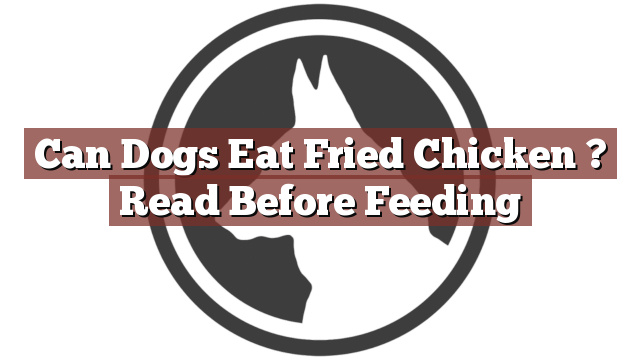Understanding Your Dog’s Dietary Needs
As a responsible pet owner, it is important to understand your dog’s dietary needs. While dogs are often considered omnivores, meaning they can consume both meat and plant-based foods, their digestive system is different from ours. Dogs require a balanced diet that consists primarily of protein from animal sources, along with essential fats, carbohydrates, vitamins, and minerals. It is crucial to provide them with a nutritionally complete and balanced diet to ensure their overall health and well-being.
Can Dogs Eat Fried Chicken? Read Before Feeding
The question of whether dogs can eat fried chicken is a common one among pet owners. Can dogs eat fried chicken? The answer is no. While dogs can technically consume cooked chicken, feeding them fried chicken is not recommended. Fried chicken is typically coated in batter or breading, which is often seasoned with spices, salt, and other ingredients that may be harmful to dogs. Additionally, the frying process adds unnecessary fats and oils, which can lead to digestive upset, obesity, and other health issues in dogs.
Pros and Cons of Feeding Fried Chicken to Dogs
Feeding fried chicken to dogs can have both pros and cons. On the positive side, chicken is a good source of protein and can provide dogs with essential amino acids. It can also be a tasty treat for them. However, the cons outweigh the benefits when it comes to feeding them fried chicken. The high fat content in fried chicken can lead to obesity, pancreatitis, and gastrointestinal problems in dogs. The seasoning and spices used in fried chicken can be harmful and may cause digestive issues, allergies, or even toxicity in some cases. It is important to remember that dogs have different dietary needs than humans, and what may be safe and enjoyable for us may not be suitable for them.
Conclusion: Make Informed Choices for Your Dog’s Health
In conclusion, it is best to avoid feeding your dog fried chicken. While they can consume cooked chicken in moderation, fried chicken is not a healthy or safe option for them. It is essential to prioritize your dog’s health and well-being by providing them with a nutritionally balanced diet that meets their specific needs. If you are looking for alternative treats or additions to their regular meals, consult with your veterinarian to ensure you are making informed choices. Remember, a healthy diet plays a crucial role in maintaining your furry friend’s overall health and longevity.
Thank you for taking the time to read through our exploration of [page_title]. As every dog lover knows, our furry friends have unique dietary needs and responses, often varying from one canine to another. This is why it's paramount to approach any changes in their diet with caution and knowledge.
Before introducing any new treats or making alterations to your dog's diet based on our insights, it's crucial to consult with a veterinarian about [page_title]. Their expertise ensures that the choices you make are well-suited to your particular pet's health and well-being.
Even seemingly harmless foods can sometimes lead to allergic reactions or digestive issues, which is why monitoring your dog after introducing any new food item is essential.
The content provided here on [page_title] is crafted with care, thorough research, and a genuine love for dogs. Nevertheless, it serves as a general guideline and should not be considered a substitute for professional veterinary advice.
Always prioritize the expert insights of your veterinarian, and remember that the health and happiness of your furry companion come first.
May your journey with your pet continue to be filled with joy, love, and safe culinary adventures. Happy reading, and even happier snacking for your canine friend!

